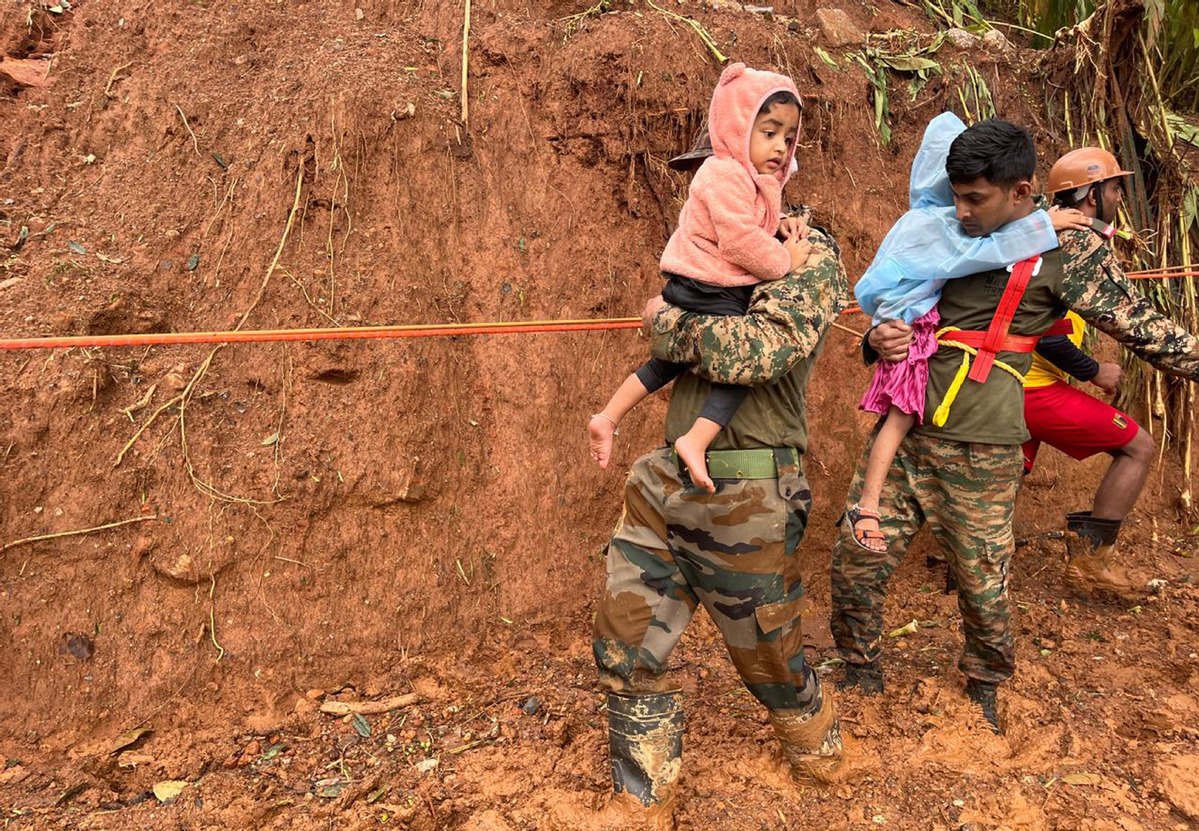
The chief minister of the southern Indian state of Kerala has expressed appreciation toward the Chinese ambassador to India and the Chinese foreign ministry in Beijing for their messages of solidarity following last week’s devastating landslides in the state that are believed to have claimed more than 350 lives.
In a post on social media platform X, the chief minister, Pinarayi Vijayan, said, “We sincerely appreciate the solidarity shown by @China_Amb_India towards the people of Wayanad during this challenging time. Also, the compassionate words of @SpoxCHN_LinJian, extending sympathies to those affected by the landslide, are truly valued.”
“Your encouragement further motivates us to continue our tireless efforts to rebuild and restore the affected areas,” Vijayan wrote.
Chinese Ambassador to India Xu Feihong and Chinese Foreign Ministry spokesperson Lin Jian both expressed deep condolences last week over the lives lost in the massive landslides, and expressed heartfelt sympathies to the bereaved families and the injured.
Expressing gratitude to China, Randhir Jaiswal, a spokesperson for India’s Ministry of External Affairs, posted on X on Aug 2: “Thank you @MFA_China. We appreciate your message of support and solidarity.”
Chinese Premier Li Qiang also sent a message to Indian Prime Minister Narendra Modi conveying condolences, on behalf of the Chinese government, following the landslide disaster, which hit hilly areas in Kerala’s Wayanad district in the early hours of July 30.
Search efforts in Wayanad’s Mundakkai and Chooralmala continued for the seventh day on Aug 6, and authorities have intensified efforts to recover bodies. As many as 221 bodies and 166 body parts have been recovered from the landslide-hit areas, while 206 persons are still missing.
Various unofficial reports, however, say that 351 people have been confirmed dead so far in the catastrophic landslides. The toll could rise further as more people are missing, and rescue workers were retrieving more bodies.
Vijayan said the repercussions of the landslide, triggered by heavy rain, were yet to subside. Kerala is still in a state of shock.
More personnel and equipment were deployed on Aug 4 to recover bodies, and the work resumed in the morning on Aug 5. Hundreds of personnel from various forces, including the Indian army, Navy, National Disaster Response Force, Coast Guard, and Madras Engineer Group, an engineering unit of the Indian Army, and forest department officials have been deployed in the search and rescue operation.
More than 1,000 government employees are currently engaged in the disaster management and relief operations in the landslide-ravaged regions in Wayanad district, Vijayan’s office said on Aug 4.
At least 9,000 persons displaced by the disaster have sought refuge in government-run relief camps.
The Kerala government is planning a township for the survivors “to ensure exemplary rehabilitation for those left homeless in the tragedy, Vijayan said on Aug 3 after a review meeting.
The Kerala state government has requested the federal government in New Delhi to declare the catastrophic event as a national disaster.
Meanwhile, a political blame game has started between the federal government and the Kerala government, which is governed by the Left Democratic Front, an alliance of left-wing political parties.
Kerala government did not gauge the severity of the situation accurately despite the federal government dispatching nine National Disaster Response Force teams to the state on July 23, India’s Home Minister Amit Shah said in the national parliament last week.
“Had those blaming the (union) government read the warnings, the situation would have been different,” he declared. The Kerala government has denied that they had been warned beforehand of the potential disaster.
The first landslide occurred at 2 am local time on July 30 (04:30 am Beijing Time) when people were asleep, followed by another two hours later.
People in Meppadi, Mundakkai and Chooralmala villages ran to save their lives. Many of those who stayed were buried by landslides that followed one after the other destroying vital infrastructure like roads, bridges and power lines, along with homes and crops.
Kerala, which is flanked by Arabian Sea to its west and the Western Ghats mountain range to the east, is accustomed to intense monsoon rainfall, given its geography.
The state was ravaged by Cyclone Ockhi in 2017, and was hit again by massive floods in 2018 which claimed 483 lives and affected millions of people, among the worst in its history.
A 2021 study revealed that 59 percent of Kerala’s landslides occur in plantation areas, highlighting the impact of land-use changes.
Wayanad lost 62 percent of its forest cover between 1950 and 2018, according to a study published in the International Journal of Environmental Research and Public Health. The study also warned that changing climate, stronger monsoon in the past two decades and land cover changes have contributed to increased frequency of the “heavy rainfall events”.
The writer is a freelance journalist for China Daily.


